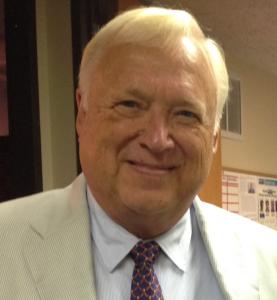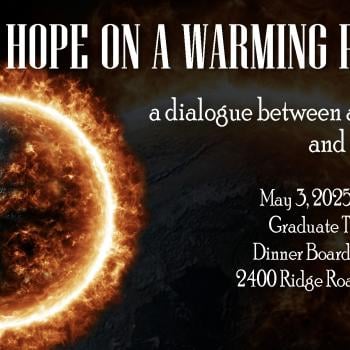
Food Insecurity
Our topic here: Food Insecurity.
Among the fine presentations in the IRAS “Science and Religion Track” at the Parliament were two spearheaded by an ol’ friend and colleague, Solomon Katz. Sol is an expert on the history of food. In this setting, he took up the future of food.
As I mentioned in a previous post on “Planetary Hugs,” I heartily celebrate the mood of the Parliament that includes passionate commitment to economic justice, global unity, and concern for the sustainability of Planet Earth. Even so, I was critical that those giving planetary hugs to Earth have ignored science and technology. But, not the IRAS “Science and Religion Track.” Here with Sol in charge we find a healthy integration of science, technology, religion, and moral urgency. Hooray!
 The matter of food insecurity is urgent because it’s clear that in many parts of the world 2019 marks the date that climate change has so accelerated that Africa and other continents now face the threat of starvation. Suddenly, the rains have become erratic and unpredictable. Previously fecund farms have dried up and no longer feed the families on the land. The threat to the very life and well-being of millions if not billions looms with ominious forbodding. It’s time to act.
The matter of food insecurity is urgent because it’s clear that in many parts of the world 2019 marks the date that climate change has so accelerated that Africa and other continents now face the threat of starvation. Suddenly, the rains have become erratic and unpredictable. Previously fecund farms have dried up and no longer feed the families on the land. The threat to the very life and well-being of millions if not billions looms with ominious forbodding. It’s time to act.
And to act globally. Food insecurity is a global moral challenge and a global moral responsibility.
The short term priority is to tweak the world distribution system so that grain gets to places in greatest acute need. Over the long term, of course, local food soverignty is requisite in regions and nations. As we move toward local food soverignty, Barry Costa-Pierce at the Parliament urges development of acquaculture–refurbishing our oceans for increased food production.
Now, I ask: might there be a role for no-kill cultivated meat in meeting food insecurity?
Food Insecuity and No-Kill Cultivated Meat
A year ago I along with a student, Brian Brosovic, began researching no-kill cultivated meat. Imagine a near endless supply of beef, pork, and poultry protein produced without grazing land or slaughter houses! And without methane pollution!
Brian and I researched the subject and interviewed laboratory scientists developing the process. In basic, stem cells would be removd from one original animal. Then the genes would be guided into differentiation to make different cuts of meat with which we are familiar. And, perhaps even new cuts of meat. One scientist claimed he could make the equivalent of one cow’s meat per day in his garage. Compare this to grazing on 30 acres of pasture for six months.
We then turned to religious spokespersons and theologians to see how no-kill cultivated meat would be accepted in differing religious traditions. The results of our research were quite interesting. If you’d like to follow up, take a look at these materials.
To Eat No-Kill Cultivated Meat. Part One: The Science
To Eat No-Kill Cultivated Meat. Part Two: Kosher?
To Eat No-Kill Cultivated Meat. Part Three: Hindus? Jains? To Eat No-Kill Cultivated Meat. Part Five: Muslims?
To Eat No-Kill Cultivated Meat. Part Six: Catholic?
To Eat No-Kill Cultivated Meat. Part Seven: Christian Vegetarian?
To Eat No-Kill Cultivated Meat. Part Eight: Food Theology?
Here is an illuminating video from TED.
Which is better for you: real meat or fake meat?
Conclusion
There is no silver bullet that when shot will immediately fix what’s broken in global food production and distribution. Yet, I hope that inexpensive no-kill cultivated meat might meet essential protein needs that would contribute to mitigation of food insecurity.
2023 Parliament of the World’s Religions: Food Insecurity
▓

Ted Peters (Ph.D., University of Chicago) is a public theologian directing traffic at the intersection of science, religion, and ethics. Peters is an emeritus professor at the Graduate Theological Union, where he co-edits the journal, Theology and Science, on behalf of the Center for Theology and the Natural Sciences, in Berkeley, California, USA. He recently co-edited Astrobiology: Science, Ethics, and Public Policy (Scrivener 2021) as well as Astrotheology: Science and Theology Meet Extraterrestrial Intelligence (Cascade 2018). He also co-edited Religious Transhumanism and Its Critics (Lexington 2022) and The CRISPR Revolution in Science, Ethics, and Religion (Praeger 2023). Peters is author of Playing God: Genetic Determinism and Human Freedom (Routledge, 2nd ed, 2002) and The Stem Cell Debate (Fortress 2007). See his website [TedsTimelyTake.com].
▓














